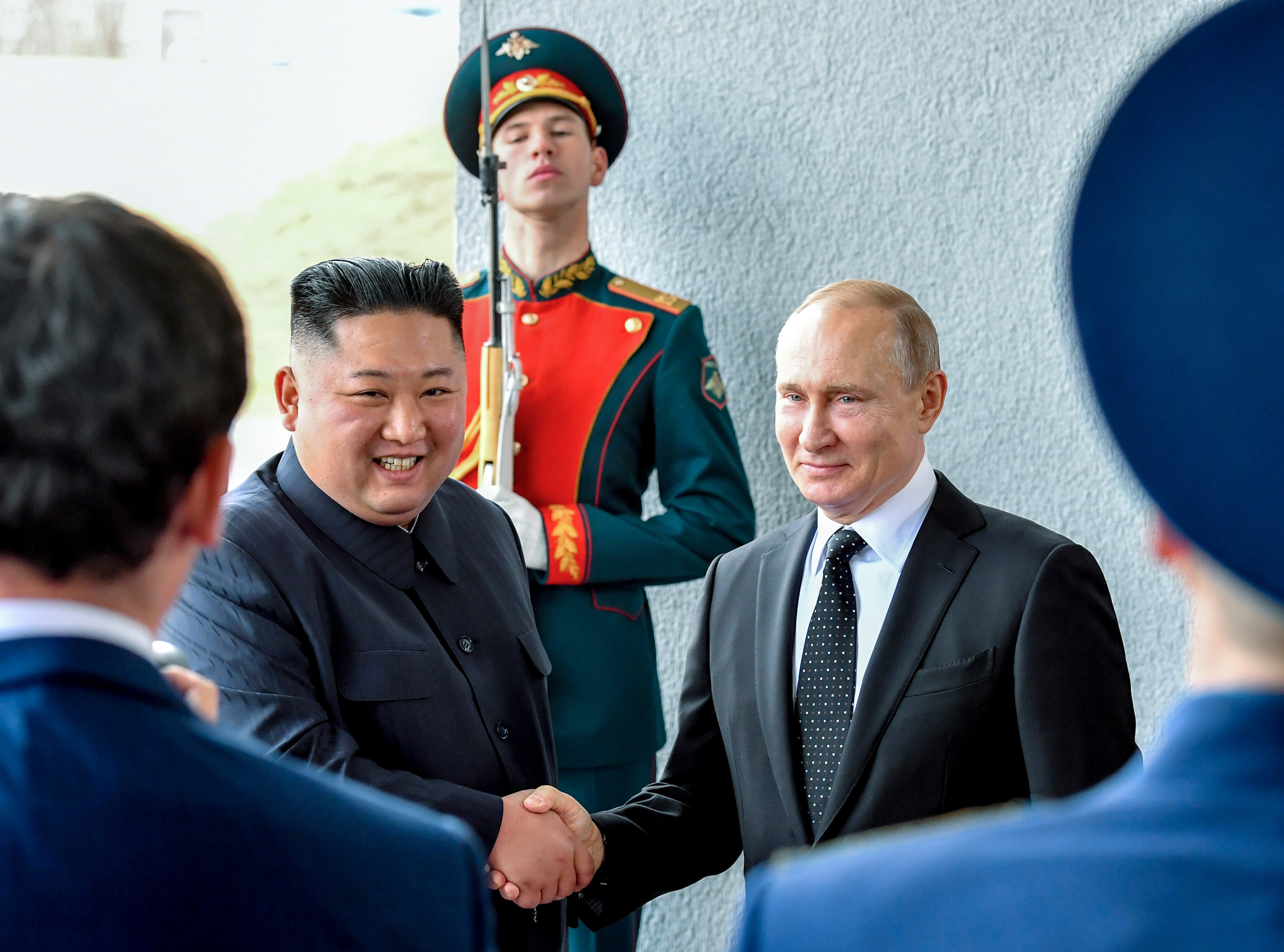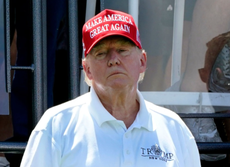Putin is not on the hunt for soldiers and weapons – but diplomatic allies
Don’t be distracted by stories on Russia trafficking troops from Cuba or tapping up Kim Jong-un for missiles, writes Mary Dejevksy. Putin is playing a very different game with his latest salvo in the bloody war


Attempting to judge the state of a military conflict is invariably a treacherous proposition. This is so almost wherever you stand: geographically, in the combat zone or at many removes, or indeed ethically – 100 per cent aligned with the victim, or inclined towards a longer perspective as to cause and effect.
The difficulties have been compounded in the war between Russia and Ukraine, because the immediate rights and wrongs are so clear, and because – for much of the Western world – the preponderance of the reporting has come from Ukraine.
One of the consequences, I would argue, has been a risky and at times irresponsible view of Ukraine’s progress – based in part on its heroic resistance in the early months – and an even more exaggerated idea of how badly Russia may be doing, based on the clear failure of its initial plan to force regime change in Kyiv, and casualty figures put out by Ukraine.
More than 18 months on, and contrary to the forecasts of a quick victory for either side, the fighting continues. And although a more sanguine view of the human cost to Ukraine seems to be gaining hold among some of those hitherto notably confident of Ukrainian success, the notion that Russia is in deep and maybe ever deeper trouble still raises its head, alongside the hope that Ukraine’s victory is just across the next trench.
Now maybe that is the more accurate perspective. Maybe, as some reports suggest, Ukraine’s summer counteroffensive is on the point of breaking through Russia’s triple-line defences, cutting Russia’s land bridge to Crimea, and possibly destroying its over-sea Kerch bridge, too.
Ukraine might then be within reach of attaining what seemed, and still seems, its most ambitious goal of recapturing the Crimean Peninsula that was annexed by Russia in 2014, as well as all the land lost since.
But, it does seem to me that some of what are now being seen as indicators of Russia’s supposedly desperate plight are in fact nothing of the kind; and indeed, to see them as such risks fuelling a dangerous illusion.
One of these is the expected meeting of Vladimir Putin, and the leader of North Korea, Kim Jong-un. Another is a report to the effect that Russia is “trafficking” mercenaries from Cuba for deployment on the front line. And you could perhaps add a third – the excited headline from London, that the UK government was proscribing the Russian Wagner private military (mercenary) company under anti-terrorist legislation, almost as though it had little armed bands of its members threatening the streets of London.
To take them in reverse order: the UK’s move against Wagner seems mistimed, at the very least, unless it was intended as a reminder of an apparent split in the Russian military effort – which is much less of a split since the plane of its leader Yevgeny Prigozhin, fell out of the sky.
A more cogent explanation was that such an order could make it possible for Ukraine to file compensation claims after the war. Whether Wagner will still exist or be solvent by then, seems doubtful. As a symbolic act, though, you could say it shows willing.
To Cuba. The number of Cubans supposedly being recruited, or “trafficked”, for the Russian war effort is put at 100. If the Russian military is running out of troops – which is the burden of this claim – 100 is not going to help. It may well be true that the Kremlin is trying to avoid another mobilisation, such as precipitated a reported exodus of some 700,000 young Russians this time last year.
But this overseas recruitment effort, if that is what it is, looks more like a throwback to Soviet-era internationalism than any realistic contribution to Russia’s troop strength. To divine that a tiny Cuban contribution is a sign that Russia is running out of troops seems fanciful in the extreme.
As does the claim that Russia is running so short of weapons that Mr Putin is begging some from North Korea. If that were the sole, or even chief, purpose of the proposed Putin-Kim meeting as early as next week, then the Russian military would indeed be in a parlous state. And maybe, just maybe, that is the correct reading.
But would North Korea really be your go-to supplier of weapons? Perhaps they have stockpiles of Red Army surplus dating back to the Korean War and Russia wants to reinforce some of its older capacity. Perhaps. But we have been here with arms supply scares before, and this one originates from the same place.
Six months ago, US officials warned China not to supply Russia with weapons, even though there was no indication that it would do so, and every indication was that it preferred to remain on the fence and was, in fact, about to present a peace plan and put itself forward as a mediator.
The hare about Russia “apparently” wanting artillery shells from North Korea was also put about by the US, in a move that seems calculated to appeal to the home gallery – and that of its ally, South Korea. It may not be coincidental that the reports started circulating just as the US and South Korea embarked on this year’s joint military exercise, Ulchi Freedom Shield.
The Putin-Kim meeting is expected to take place in the Pacific port of Vladivostok and the fact that Mr Kim is the one travelling abroad (albeit probably in an armoured train) suggests that he wants the meeting quite as much, or perhaps more, than Mr Putin does.
It also suggests that if there are any arms deals, it is Mr Kim who is at least as interested in what Russia may have to offer as Putin might be in North Korean shells and anti-tank missiles. It may be worth noting, too, that the thaw in US-North Korea relations, when Donald Trump met Mr Kim, has been reversed by Joe Biden and the North Korean leader could be casting around for new/old friends.
Something similar may apply to Russia, with Moscow perhaps seeing the meeting as less of an arms procurement opportunity than a diplomatic exercise. As such, it would be part of a wider attempt by Putin to demonstrate to the West that its efforts to isolate Russia have failed and that it has alternatives.
Putin received President Erdogan of Turkey in Sochi (on the Black Sea) last week. A trip to Vladivostok would show Russia as an East-facing, as well as a West- and South-facing power. Putin has also been keen to keep relations with China on an even keel – probably less for the sake of weapons than as a growth market for oil and gas – and has held regular meetings with Xi Jinping.
For whatever reason, neither Putin nor Xi will attend this weekend’s Group of 20 summit in India – Putin perhaps because of the risk he could be cold-shouldered by the pro-Western members; Xi reportedly out of reluctance to meet Biden.
Another signal sent by their absence, however, could be more significant.
Both have been cultivating an expanded Brics grouping of “emerging” economies, as an alternative to the G20, and a counterweight to the G7.
There is speculation that Putin’s Sochi meeting was part of a move to persuade Turkey to join the Brics, in addition to the six members just added, which include Argentina, Nigeria and Egypt.
Led by Russia and China, an expanded Brics, as a constituency and a voice for the so-called “global South”, could reshape the international system no less comprehensively than the war in Ukraine could be reshaping Europe.







Join our commenting forum
Join thought-provoking conversations, follow other Independent readers and see their replies
5Comments